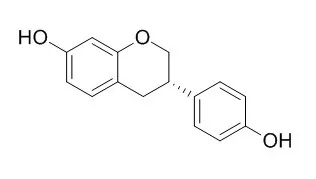| Kinase Assay: |
| J Biol Chem. 2015 Mar 6;290(10):6047-57. | | Equol, an isoflavone metabolite, regulates cancer cell viability and protein synthesis initiation via c-Myc and eIF4G.[Pubmed: 25593313] | Epidemiological studies implicate dietary soy isoflavones as breast cancer preventives, especially due to their anti-estrogenic properties. However, soy isoflavones may also have a role in promoting breast cancer, which has yet to be clarified. We previously reported that 4',7-Isoflavandiol, a metabolite of the soy isoflavone daidzein, may advance breast cancer potential via up-regulation of the eukaryotic initiation factor 4GI (eIF4GI). In estrogen receptor negative (ER-) metastatic breast cancer cells, equol induced elevated levels of eIF4G, which were associated with increased cell viability and the selective translation of mRNAs that use non-canonical means of initiation, including internal ribosome entry site (IRES), ribosome shunting, and eIF4G enhancers. These mRNAs typically code for oncogenic, survival, and cell stress molecules. Among those mRNAs translationally increased by 4',7-Isoflavandiol was the oncogene and eIF4G enhancer, c-Myc.
METHODS AND RESULTS:
Here we report that siRNA-mediated knockdown of c-Myc abrogates the increase in cancer cell viability and mammosphere formation by 4',7-Isoflavandiol , and results in a significant down-regulation of eIF4GI (the major eIF4G isoform), as well as reduces levels of some, but not all, proteins encoded by mRNAs that are translationally stimulated by 4',7-Isoflavandiol treatment. Knockdown of eIF4GI also markedly reduces an equol-mediated increase in IRES-dependent mRNA translation and the expression of specific oncogenic proteins. However, eIF4GI knockdown did not reciprocally affect c-Myc levels or cell viability.
CONCLUSIONS:
This study therefore implicates c-Myc as a potential regulator of the cancer-promoting effects of 4',7-Isoflavandiol via up-regulation of eIF4GI and selective initiation of translation on mRNAs that utilize non-canonical initiation, including certain oncogenes. |
|






 Cell. 2018 Jan 11;172(1-2):249-261.e12. doi: 10.1016/j.cell.2017.12.019.IF=36.216(2019)
Cell. 2018 Jan 11;172(1-2):249-261.e12. doi: 10.1016/j.cell.2017.12.019.IF=36.216(2019) Cell Metab. 2020 Mar 3;31(3):534-548.e5. doi: 10.1016/j.cmet.2020.01.002.IF=22.415(2019)
Cell Metab. 2020 Mar 3;31(3):534-548.e5. doi: 10.1016/j.cmet.2020.01.002.IF=22.415(2019) Mol Cell. 2017 Nov 16;68(4):673-685.e6. doi: 10.1016/j.molcel.2017.10.022.IF=14.548(2019)
Mol Cell. 2017 Nov 16;68(4):673-685.e6. doi: 10.1016/j.molcel.2017.10.022.IF=14.548(2019)